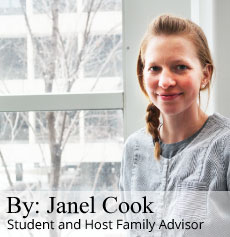But I like to sit in my room...

Every school year we inevitably hear from host parents that their student is spending a lot of time in their bedroom, thus not interacting with the family. This can be a frustrating aspect of hosting for some families.

There are several factors at play in this 'life is better in my room' scenario. First, teenagers crave alone time much more than they did when they were children. Gone are the days when they want to be around their parents and siblings all the time to fulfill their needs. Instead, teens begin to rely more on friendships with people similar in age to fulfill their social needs and transition from dependency on their family for all aspects of their lives to independence and a life outside of the family unit.
Second, international teenagers are coming from a home life that is quite different than what they are experiencing here in the USA. Most often their sole responsibility is to study and earn good grades at home. They are not expected to do chores, cook for themselves, do their own laundry, or offer to help clean up because that would take away from their study time.
Third, now more than ever, technology allows for teenagers to have instant contact with one another. This is especially important for international students in order to maintain relationships in their home countries. However, there is a delicate balance to not over-indulge in technology use (including gaming) while establishing face-to-face contact, which builds relationship and trust with the Host Family and friends while on program.
But we want to interact more with our student…
Fortunately, Foreign Partners prepare and remind students to spend time outside of their bedrooms before they arrive in the USA. They explain that family expectations in the USA will be different than what they are used to. Student’s Local Reps and Coordinators also go through orientation with students to remind them to spend regular time with their Host Family. Of course, putting this idea into practice is not always a smooth transition, especially when it is not something they are experienced at doing!
Direct guidance and suggestions may benefit the student to socialize with a Host Family. It may be presented to the student that every family member (point out they are now a family member) is expected to join the family for dinner every night, socialize, and clean up together for a period of time after dinner. FYI: Feedback from students is that they are unsure what to talk about with their families!
Students who are involved with extra-curricular activities at school tend to make better use of their time and this also elicits more socializing practice. Encourage your student to join you or your children in participating in an activity in the community through church, volunteering, theater, etc.
Other ideas: Establish family game nights, make one evening a month a theme night and make plans accordingly (American history, science, dance, music, theater, nature walk, another culture, poetry reading, etc.), plan on making an international dinner on the weekend occasionally and ask what dish you could help them make from their home country, plan an Internet free day for the entire family once per month, take your student out for coffee, tea, or a smoothie to chat about life. Or better yet, make smoothies at home together and chat while doing so.
If the Host Family feels that they need extra support at any time throughout any situation they are encouraged to contact their Local Rep, Coordinator, or call the National Office (800-622-3553) and ask to speak with a Student and Host Family Advisor.